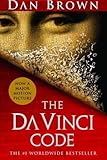 The Da Vinci Code
The Da Vinci Code
by Dan Brown
What’s the real Truth?
As a friend of mine wrote when commenting on a previous Firestarter, belief in truth demands a commensurate belief in logic and critical thinking, which accepts and permits the growth of knowledge and more truth. Once we do this, we can then accept that new facts and theories will mean we must accordingly change our beliefs in order to be responsible followers of Truth.
To live in denial, to lie and deny truth, to deny the rights of others, is simply not responsible. It doesn’t matter if an antiquated religion says it’s all right to lie to, cheat, and kill women, or those weaker than you, or non-believers. That sort of behavior is ultimately neither responsible nor truthful.
In the end it doesn’t really matter if someone named Jesus lived or not, and if someone named Mary was really his wife or not. What matters is whether or not we treat each other kindly, responsibly, and truthfully in the here and now.
Couple thoughts:
– I seriously doubt Anthony of Padua was actually the patron saint of the human ass. Since he’s also the patron saint of animals, I’m suspecting they meant the animal ‘ass’. After all, there’s no patron saint of arms or heads, or noses, or even the appendix. :}
– I don’t know about many of the other things, but it doesn’t surprise me at all there was more than one patron saint of sexual temptation. Seems to me that that loomed large on the minds of most Catholics, and they’d want the blessings of the saints to help them overcome it.
– In answer to your question on why so many saints, I’m cynical enough to say that while the Catholics very likely did want their heroes, that it’s not at all impossible that the Church (or at least, certain representatives of it) might have padded the rolls a little.
– As I told you before, I too noticed the ‘poor obfuscation’ towards the end, and I’m not near as perceptive as you…
– In regards to Sophie’s violent response to the ritual she stumbles in on: it seems to me that that was not an entirely unreasonable reaction. If she’d just stumbled in on him having sex, that would be one thing. But with all the pomp and ceremony, it would seem to have some darker meaning, hmm? Sex as part of ritual tends to be associated with the devil rather than the divine. (I don’t know how religious the French are, but I suspect that kind of social indoctrination is still present regardless.)
– In regards to why others might have been shocked and appalled at the idea of Jesus being married…I suspect that once again, it comes down to sex. At least, in part. Jesus as the Son of God would have no need of a wife, being above such desires as mortal love, lust, or the desire to create progeny. To even suggest that he might have had one hints at motives that people don’t want to ascribe to Jesus. At the very least, it would throw the smallest bit of doubt as to his divinity. And doubt is what the religious avoid like the plague, if they can help it.
Excellent synopsis and analysis, and an enjoyable learning experience, as your writing always is.
Having just finished the Da Vinci Code, it was serendipitous that you reviewed it. I definitely agreed about the use of extremes (albino, blah blah blah), and it was an amusing read. General consensus is that while they make good reading, most of his revelations are really nothing of the sort (but it’s fiction, after all). I tried to find a better article that Slate had written analyzing the history that Brown makes use of, but could only find this: http://slate.msn.com/id/2090640
Not as good as the original one I read (I swear it was Slate, maybe Salon or somewhere else?) but figured I’d pass it along. It’s interesting to read that after having read a lot of Pagels! (Overall while I enjoyed DC, I found Pagel’s real history more fascinating, and the whole ‘oooh’ over the sex rite was just… silly. (I mean, yeah, I can imagine being traumatized by seeing your grandpa starkers, but I mean 10 years? sheesh!
Quote from the book review: “We don’t have any divine, or even very powerful, women in Christianity”
I would take minor exception with this. Santa Teresa de Avila and Hildegard von Bingen were 2 powerful and influential nuns (prioresses?) within the Catholic heirarchy in their time. They were both mystics.
Also, I’m not sure I’d attribute all the excitement about the book to antifeminist fervor. My feeling is that if Brown had asserted that Jesus was really an upper-class Roman in desguise, or something similar, he’d have created a comparable uproar. It’s the fundamentalist literalists that are offended, because their whole value system is based on the inerrancy of the Holy Scriptures. Proposing that Jesus was married casts doubt on their structure of beliefs.
Also, arch-conservatives do need something to hate. They were very uncomfortable for awhile, when the Soviet Union collapsed. Now they have Muslims, so they’re much happier. Not that reaction to the DC reaches that level of emotion, but they do have a very low boiling point.